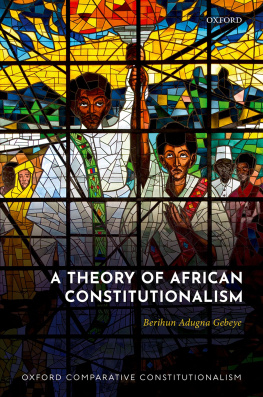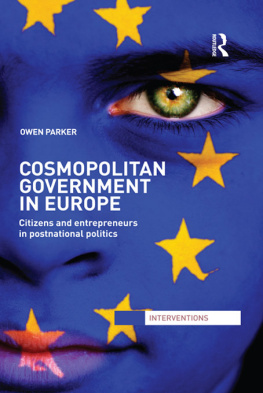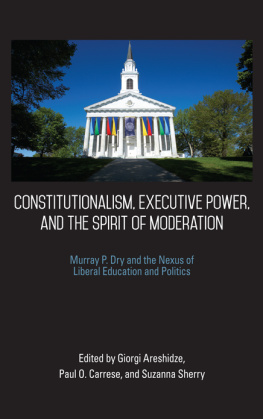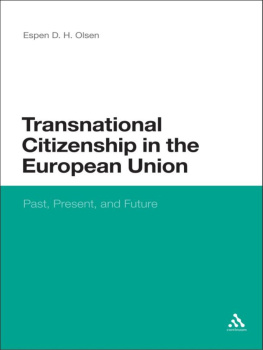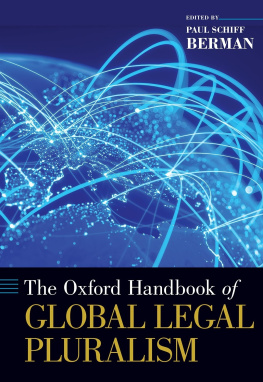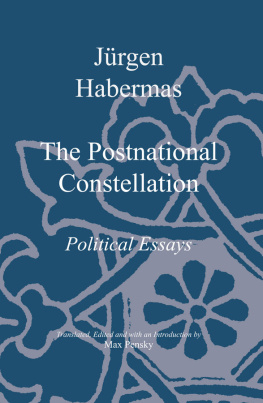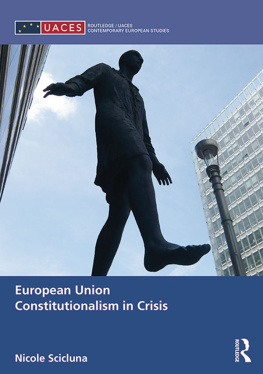Beyond Constitutionalism:
The Pluralist Structure of Postnational Law
Nico Krisch
Series Editors:
Martin Loughlin, John P. McCormick, and Neil Walker
Beyond Constitutionalism: The Pluralist Structure of Postnational Law
Series Editors:
Martin Loughlin, John P. McCormick, and Neil Walker
One consequence of the increase in interest in constitutions and constitutional law in recent years is a growing innovative literature in constitutional theory. The aim of Oxford Constitutional Theory is to provide a showcase for the best of these theoretical reflections and a forum for further innovation in the field.
The new series will seek to establish itself as the primary point of reference for scholarly work in the subject by commissioning different types of study. The majority of the works published in the series will be monographs that advance new understandings of the subject. Well-conceived edited collections that bring a variety of perspectives and disciplinary approaches to bear on specific themes in constitutional thought will also be included. Further, in recognition of the facts that there is a great deal of pioneering literature originally written in languages other than English and with regard to non-anglophone constitutional traditions, the series will also seek to publish English language translations of leading monographs in constitutional theory.

(p.iv) 
- Great Clarendon Street, Oxford OX2 6DP
- Oxford University Press is a department of the University of Oxford.
- It furthers the University's objective of excellence in research, scholarship,
- and education by publishing worldwide in
- OxfordNew York
- AucklandCape TownDar es SalaamHong KongKarachi
- Kuala LumpurMadridMelbourneMexico CityNairobi
- New DelhiShanghaiTaipeiToronto
- ArgentinaAustriaBrazilChileCzech RepublicFranceGreece
- GuatemalaHungaryItalyJapanPolandPortugalSingapore
- South KoreaSwitzerlandThailandTurkeyUkraineVietnam
- Oxford is a registered trade mark of Oxford University Press
- in the UK and in certain other countries
- Database right Oxford University Press (maker)
- All rights reserved. No part of this publication may be reproduced,
- stored in a retrieval system, or transmitted, in any form or by any means,
- without the prior permission in writing of Oxford University Press,
- or as expressly permitted by law, or under terms agreed with the appropriate
- reprographics rights organizations. Enquiries concerning reproduction
- outside the scope of the above should be sent to the Rights Department,
- Oxford University Press, at the address above
- You must not circulate this book in any other binding or cover
- and you must impose the same condition on any acquirer
- British Library Cataloguing in Publication Data
- Data available
- Library of Congress Cataloging in Publication Data
- Data available
PART I Visions of Postnational Law
Part II Pluralism in Postnational Practice
Part III Pluralism's Virtues (and Vices)
(p.v) Acknowledgements
This book has been long in the making. It has progressed in fits and starts, through phases of stagnation, interruption, and distraction, and through a process in which, for long, my ideas kept changing direction every time they seemed settled. Some of these changes were due to the different intellectual environments I have worked in over the last ten yearsthe idea to write a book on postnational law, pluralism, and constitutionalism came up while I was at NYU Law School and took shape during my years at Merton College, Oxford; most chapters were written while I taught at the London School of Economics and finished now that I work at the Hertie School of Governance in Berlin. All these contexts have provided me with different stimuli, but they have all proved to be enormously enriching, and I wish to thank my colleagues at all of themas well as the institutions themselvesfor the outstanding support I enjoyed. I also thank the Max Planck Society for the Advancement of Science for its generous financial support in the early stages of the project.
Many people have helped me directly, especially by reading and commenting on parts of the book as it was emerging. For this, I owe much gratitude to Aida Torres Prez, Alec Stone Sweet, Alejandro Chehtman, Alejandro Siz Arnaiz, Alexander Somek, Andrew Lang, Anne Peters, Anne Thies, Anthea Roberts, Benedict Kingsbury, Carol Harlow, Caterina Garca, Cathryn Costello, Chandran Kukathas, Christian Walter, Christoph Mllers, Craig Scott, Eran Shamir-Borer, Ewan Macdonald, Greg Shaffer, Jo Murkens, Jochen Frowein, Joseph Weiler, Julia Black, Luzius Wildhaber, Marisa Iglesias, Mark Kayser, Martin Loughlin, Mattias Kumm, Michael Zrn, Neil Walker, Nicolas Lamp, Oriol Casanovas, Pavlos Eleftheriadis, Richard Stewart, Stephen Weatherill, Tom Poole, and Wibren van der Burg. I also wish to thank participants in workshops, conferences, and colloquia at the European University Institute, the Hertie School of Governance, the LSE Law Department, NYU Law School, Oxford University's Law Faculty, Princeton University's Woodrow Wilson School, the Law School at Queen's University, Belfast, the University of Bielefeld, Westminster University, Yale Law School, and the Law Faculty at Universitat Pompeu Fabra. The last has also proved to be a most welcoming environment during my stays in Barcelona. Aram Khaghaghordyan, Corey Barber, and Dana Trif have (p.vi) provided very valuable research assistance in the final stages of the book, and Natasha Knight, Lucy Page, and Joy Ruskin-Tompkins have steered the book through the production process at OUP with admirable effectiveness.
Most of all, though, I wish to thank Neus Torbisco Casals for her unflinching support throughout the project, despite the fact that it meant much more work for her and less time for us together. I owe apologies to our daughter, Clarashe tried to sabotage my work whenever she could but eventually (and grudgingly) accepted that I spent many evenings and weekends with my computer rather than with her. I cannot really make up for that, but I promise that the next book project will have to wait some time.
* * *
Some of the chapters are based on other publications of mine, and I gratefully acknowledge those publications as well as the permission to use the material in this book. Parts of Chapters 2 and 3 are to appear as The Case for Pluralism in Postnational Law in G de Brca & J H H Weiler (eds), The Worlds of European Constitutionalism, Cambridge: Cambridge University Press, forthcoming. An earlier version of Chapter appeared as Pluralism in Postnational Risk Regulation: The Dispute over GMOs and Trade,


